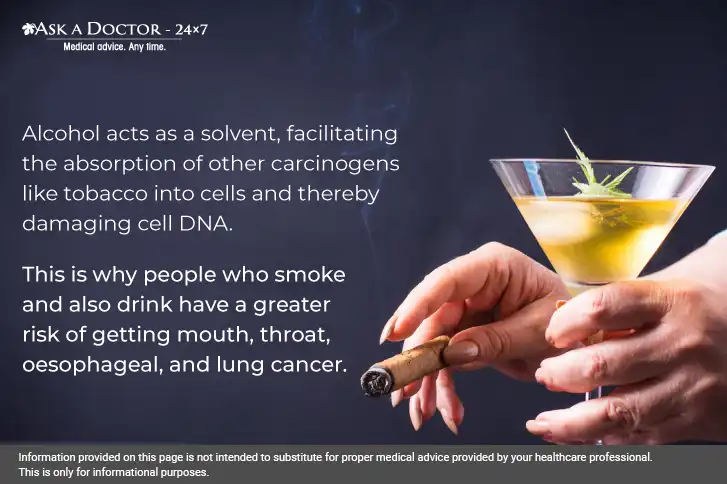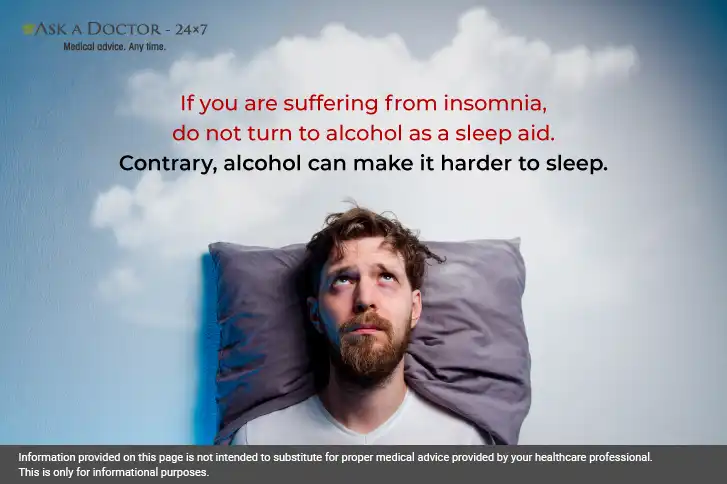Alcohol And Cancer: Things You Must Know
Billions of people worldwide drink alcohol to alter their emotional state. People mostly drink to socialize, lower tension and anxiety, and enjoy feelings of exhilaration, relaxation, and disinhibition. Ethanol (often known as ethyl alcohol) is the type of alcohol that is consumed daily. It is made by fermenting yeast, sugars, and starches. Do you know that ethanol has negative physiological effects on our bodies? Alcohol suppresses the central nervous system, which affects judgment and coordination. Also, alcohol misuse, including binge drinking, can lead to the development of crippling alcohol addiction.
Ethanol can be metabolized by the human liver only in small amounts. Long-term intake not only harms the liver, brain, and other vital organs but also increases the likelihood of cancer. Alcohol is a known carcinogen (a substance capable of causing cancer). There may be discussions concerning whether some alcoholic beverages are healthier than others. However, alcohol itself is harmful, even in tiny doses, and any form of alcohol raises the risk of cancer. Therefore, you can only lower your risk of cancer by reducing your alcohol use.
Let us discuss in detail how alcohol is associated with the risk of cancer.
How Alcohol Raises the Risk of Cancer

It is not necessary that drinking alcohol will definitely result in cancer, but yes, the risk is higher in people who consume alcohol than non-drinkers. Let us understand how alcohol-induced cancer is caused:
- Cell damage: Alcohol consumed is converted by our bodies into a toxic byproduct, acetaldehyde. In addition to harming our cells, acetaldehyde can prevent their healing.
- Modifications in hormones: Hormones are chemical messengers in our body. Certain hormones, like insulin and estrogen, can rise when we drink alcohol. These hormones can cause cells in our body to divide more often and can modify how cells grow and divide, increasing the likelihood of cancer.
- Direct tissue damage: Alcohol may facilitate the absorption of damaging substances by increasing the absorption of other carcinogens. e.g., alcohol can make it easier for cells in the mouth and throat to absorb harmful chemicals.
- Hinders absorption of important nutrients: Alcohol use may impair the body's capacity to digest and absorb vital nutrients such as vitamins A, C, D, E, folate, and carotene.
Types of Cancer Commonly Associated with Alcohol Drinking
Your risk of cancer increases with alcohol consumption. Alcohol use is linked to distinct cancer forms, most commonly in the following locations:
- Breast cancer
- Bowel cancer
- Oral cancer
- Throat cancer involving the esophagus (food pipe), larynx (voice box), and pharynx (upper throat)
- Hepatic cancer
- Colorectal cancer
Other cancers associated with the use of alcohol are prostate cancer, pancreatic cancer, and melanoma.
Things One Can Do to Stop or Limit Alcohol Consumption

One can lower his/her alcohol-related risk of cancer, by:
- Identifying the behaviors or activities that trigger alcohol usage: Alcohol slows down the central nervous system and impairs inhibition, judgement, and memory. It is frequently used by people as a coping technique, for relaxation, to control anxiety, to alleviate stress, or to combat insomnia. Hence, seeking advice from a medical practitioner can be a first step in discovering further coping strategies and techniques for lowering stress, anxiety, and insomnia instead of consuming alcohol.
- Breaking the habit loop of alcohol consumption: Establishing limits on alcohol consumption and making a strategy for drinking before social events are crucial. For instance, having a "mocktail" might be a fantastic substitute for alcohol at social gatherings.
- Joining in support groups/ rehab: You can join personal and virtual resources/ support groups for people trying to cut down on or quit drinking alcohol. Ask your doctor if you need support with stopping alcohol use.
- Refraining from using tobacco products and alcohol together: The chance of getting certain malignancies can be considerably increased by combining alcohol and tobacco products. These comprise esophageal, laryngeal, pharyngeal, and oral malignancies. Hence, avoid using both alcohol and tobacco products.
Besides the above pointers, one must also limit the number of alcoholic beverages you drink. Following is the CDC's recommended gender-wise alcohol consumption limit:
- Women should only have one drink or less of alcohol each day.
- Men should not exceed two drinks every day.
- Do not drink heavily or binge drink (consuming four drinks or more for women, or five drinks or more for men, on an occasion)
Conclusion
To conclude, the research determines that no degree of alcohol use is totally safe, and even modest alcohol consumption raises the risk of cancer. Drinking alcohol raises the risk of various cancers, including those that affect the mouth, throat, esophagus, stomach, colon, liver, and breast. Alcohol is a carcinogen, so if you are planning a pregnancy, pregnant and/or breastfeeding, or under 18 years of age, it is advisable not to drink alcohol. Talk with your doctor about the risks associated with alcohol use and how you should limit your alcohol intake.
If you have any questions related to alcohol misuse or cancer, you can check with our specialized Oncologist at Ask a doctor, 24x7.
Recently Answered Questions Related to Alcohol and Cancer
- What are the Gallbladder Cancer Symptoms?
- Does Gastroscopy Cause Sore Jaw?
- Suggest Treatment For Rectal Cancer
- Does Alcoholism Cause A High MCV?
- What Does My Liver Function Test Report Indicate?
- How Can Acute Alcoholism With Cigarette Smoking Be Treated?
- What Is The Cure For Internal Shaking Or Muscle Movements?
- Can Severe Alcoholism Accelerate MS?
Disclaimer: Information provided on this page is not intended to substitute for proper medical advice provided by your healthcare professional. This is only for informational purposes.
Ask a Specialist
Recent Questions


